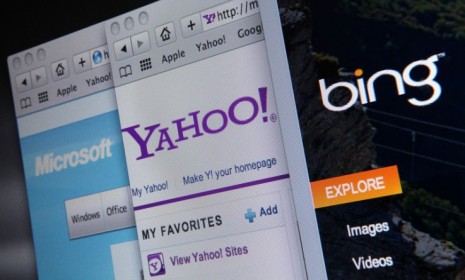Is Microsoft's Bing search engine officially a disaster?
The software giant just wrote off $6.2 billion from its Bing-anchored online unit, wiping out the venerable company's entire quarterly profit

A free daily email with the biggest news stories of the day – and the best features from TheWeek.com
You are now subscribed
Your newsletter sign-up was successful
Late on July 2, Microsoft disclosed that it will write down $6.2 billion from its Online Services Division, conceding that the unit will perform much worse than the company had predicted. Forecasts for this division were pretty rosy five years ago, when Microsoft bought digital advertising company aQuantive for $6.3 billion and, in 2009, when it launched Bing, a big public rebranding of its search portal. It was all part of a larger push to eat into rival Google's online dominance. But now, the write-down at the internet division, which also includes MSN, will wipe out all of Microsoft's profit for the quarter. Is this a good time to formally declare Microsoft's expensive, perpetually money-losing foray into internet search a dismal failure?
Yes. Bing has failed: Clearly, the aQuantive deal really didn't work out for Microsoft, says David Goldman at CNNMoney. But the real reason the online unit hasn't turned a profit in at least five years is "Microsoft's inability to catch up with Google in the online search race." Bing has seen some growth in search — much of it from "cannibalizing its search partner," Yahoo — but Google has grown far more. And Bing's 15 percent market share is only about half what it needs "to capture the attention of a critical mass of advertisers — enough to turn a profit."
"Microsoft's $6 billion whoopsie"
The Week
Escape your echo chamber. Get the facts behind the news, plus analysis from multiple perspectives.

Sign up for The Week's Free Newsletters
From our morning news briefing to a weekly Good News Newsletter, get the best of The Week delivered directly to your inbox.
From our morning news briefing to a weekly Good News Newsletter, get the best of The Week delivered directly to your inbox.
No. Things are looking up at Bing: Yes, "Bing is still a distant No. 2" in search, but "Microsoft touted some recent improvements," says Robert J. Mullins at eWeek. Globally, Bing is expanding its geographic and market reach — it's up to 28 percent, according to Experian Hitwise — its revenue per search is growing, and it just announced plans to include Yelp reviews in its web search results, which should make Bing more attractive for searchers. Don't write Microsoft's search portal off yet.
"Microsoft takes $6.2 billion write-down for aQuantive acquisition"
This write-down tells us nothing new: Microsoft's adventures in online advertising have clearly never come close to fulfilling the company's expectations, says Staci D. Kramer at TIME. But as huge as $6.2 billion sounds, it's "barely a blip for Microsoft." And as for what this write-down "says about Microsoft, there's not much new other than, possibly, the admission that... Microsoft hasn't been able to crack the nut on interactive advertising." That's nothing we didn't already know, which is why investors greeted the news with a shrug.
"Microsoft writes off most of its 2007 $6.3B ad business bet"
A free daily email with the biggest news stories of the day – and the best features from TheWeek.com
-
 The ‘ravenous’ demand for Cornish minerals
The ‘ravenous’ demand for Cornish mineralsUnder the Radar Growing need for critical minerals to power tech has intensified ‘appetite’ for lithium, which could be a ‘huge boon’ for local economy
-
 Why are election experts taking Trump’s midterm threats seriously?
Why are election experts taking Trump’s midterm threats seriously?IN THE SPOTLIGHT As the president muses about polling place deployments and a centralized electoral system aimed at one-party control, lawmakers are taking this administration at its word
-
 ‘Restaurateurs have become millionaires’
‘Restaurateurs have become millionaires’Instant Opinion Opinion, comment and editorials of the day